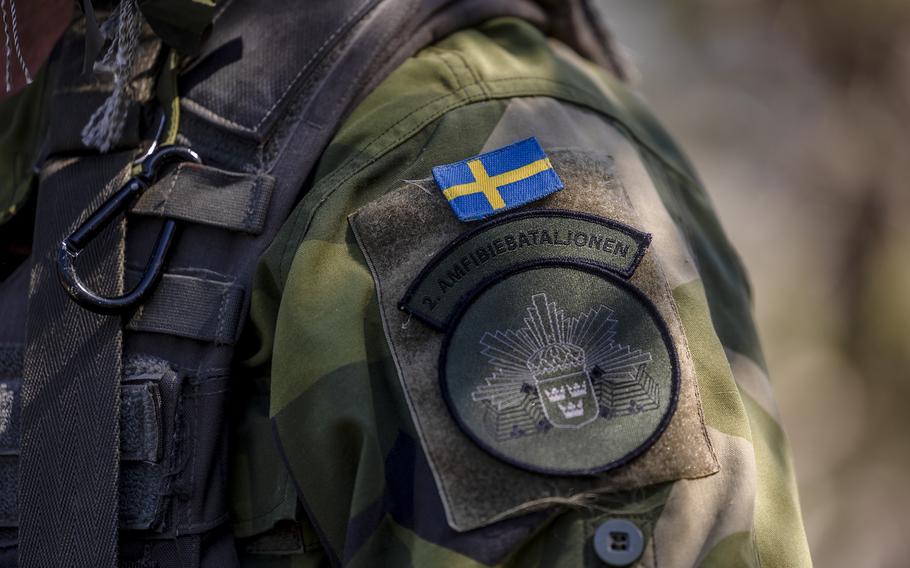
The patch of a Swedish Amphibious Battalion soldier is shown during the Baltic Operations NATO military drills (Baltops 22) on June 11, 2022, in the Stockholm archipelago, the 30,000 islands, islets and rocks off Sweden’s eastern coastline. (Jonas Gratzer, Getty Images/TNS)
History is linear, yet it is punctuated by discontinuities. Things that seemed like fixtures in the firmament of the global order sometimes vanish overnight. On Dec. 26, 1991, the Soviet Union disappeared after 69 years. On Sept. 11, 2001, American security vanished in the blink of an eye. This year — on Feb. 24 — the hallowed tradition of political neutrality died when Russia invaded Ukraine.
Through a policy of neutrality and nonalignment, Sweden avoided war for more than 200 years. It escaped mostly unscathed from the world wars of the 20th century while much of Europe was reduced to rubble. By the 21st century, nonalignment had become an integral part of Swedish national DNA, a principle of identity defining what it meant to be a Swede. Swedes took pride in their reputation as a “moral superpower.” In December, Swedish Prime Minister Magdalena Andersson stated, “Our nonparticipation in military alliances serves our country well and contributes to stability and security in northern Europe. Sweden will not apply for membership in NATO.”
The country abandoned a 2-century-old tradition within three months of Russian President Vladimir Putin’s invasion of Ukraine.
Finland’s trajectory from nonalignment to NATO membership was more a pragmatic calculation than an ideological or moral one. Having fought dozens of wars against Russia in its history, including the brutal winter and continuation wars against the Soviet Union in the 20th century, and sharing a border with Russia of more than 800 miles, Finland has historically been distrustful of Russia. Unlike many that demobilized and disarmed when the Cold War ended, it retained male conscription and developed a whole-of-society defense architecture dubbed “comprehensive security.” As a result, Finland today can mobilize up to 280,000 armed and trained reservists within two weeks. Nonetheless, Feb. 24 convinced Finland’s leaders that they could no longer risk going it alone.
On May 18, Sweden and Finland submitted official letters of application to join NATO despite a threat from Russia that their applications would be met with “military and political consequences.” The hope was that their accession would be nearly immediate, though past applications have taken years in some cases. Despite Turkish demands and Hungary’s inertia, Russia’s invasion has galvanized the alliance and will likely result in the swiftest ever NATO membership process.
Putin’s flagrant repudiation of generations of prohibition against territorial conquest marks an inflection point for all nations that wish international relations to be governed by the rule of law rather than by the rule of brute force. He pushed the envelope too far; he crossed a red line, moving Sweden to abandon its moral commitment to nonalignment and Finland its pragmatic nonalignment.
In an ironic twist of fate, Putin’s paranoid obsession with countering NATO expansion has produced precisely that — not only a growth in NATO membership but also an enhancement of its solidarity and military capabilities and a dramatic strengthening of the northern flank. This is a fitting asymmetric retribution and retaliation for his disastrous miscalculation in invading Ukraine and an unexpected gray-zone victory for NATO: a substantial strategic gain well-below the threshold of armed conflict.
Now the spotlight is on the remaining nonaligned and neutral nations. Will India remain on the fence? It has publicly reprimanded Putin while subsidizing his war effort through increased fuel purchases. Can Switzerland and Austria maintain their principled commitments to neutrality? And the other countries that did not vote at the United Nations to condemn Russia’s invasion? How will they justify nonalignment in the face of such blatant disregard and disrespect for the venerable concept of self-determination, not to mention the increasingly indisputable commission of gruesome war crimes and even crimes against humanity?
The prohibition against territorial conquest is deeply embedded in the rules-based world order established in the dust and rubble of World War II. This prohibition is one of the few safeguards against the reemergence of such catastrophic conflict. Putin’s reckless decision to claim territory universally recognized as sovereign Ukrainian land signals a rejection of all the safeguards against the suicidal proclivities that drove nations to war twice in the 20th century.
This is a time of moral crisis, and as Sweden and Finland have realized, there is no legitimate justification today for neutrality or nonalignment.
Michael Miklaucic is a lecturer at the University of Chicago’s Harris School of Public Policy and a senior fellow at National Defense University. The views in this op-ed are his and do not reflect the policy, strategy or positions of NDU, the Department of Defense or the U.S. government.